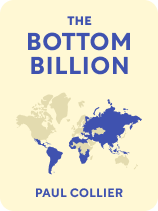

This article is an excerpt from the Shortform book guide to "The Bottom Billion" by Paul Collier. Shortform has the world's best summaries and analyses of books you should be reading.
Like this article? Sign up for a free trial here .
What poverty remedies can the West provide to developing nations? What mistakes do Western countries often make when trying to provide aid?
In his book The Bottom Billion, economist Paul Collier proposes four ways the West can assist poor nations. His suggestions are foreign aid, military intervention, laws and charters, and trade policies.
Let’s look at each one of Collier’s poverty remedies in detail.
Remedies for the Bottom Billion
Having explained the four factors that trap the bottom billion in poverty, Collier then discusses four poverty remedies he believes the West and poor nations can apply to break those poverty traps.
(Shortform note: Collier doesn’t emphasize political reforms as strongly as other scholars. He also believes in refocusing on economic growth, rather than on more “photogenic” social priorities like holding elections and increasing school enrollment.)
Remedy #1: Foreign Aid
The first poverty remedy Collier examines is foreign aid, which he argues can be useful to spurring growth among bottom billion economies under the right circumstances. Among poor nations, Collier estimates that foreign aid adds about a percentage point to annual GDP. For many nations, receiving foreign aid in any amount prevents their living standards from getting worse. However, Collier believes that aid can go further when it’s used intentionally.
In Collier’s view, most traditional approaches to foreign aid focus on a “one size fits all” strategy of providing aid to all extremely poor nations. Collier believes this strategy fails to consider how foreign aid interacts differently with each poverty trap. He tailors his foreign aid strategy to account for the disparate impact these traps have on the effectiveness of the aid. In this section, we’ll explain the traditional approaches of using foreign aid, then explain how Collier’s approach would differ.
Aid and Conflict
Traditional approach: Collier’s own analysis suggests roughly 11% of traditional foreign aid winds up funding the recipient country’s military, and that 40% of Africa’s total military budget comes from aid. Collier says that foreign aid does not increase the chance of civil war, but it does slightly increase the risk of a coup in conflict-prone countries—presumably because the foreign aid boosts the government revenue that bad actors want to appropriate.
Collier’s approach: Collier argues that aid to conflict-prone regions needs to be disbursed with caution. Aid earmarked for specific projects or aid in the form of technical assistance may be more appropriate for conflict-prone countries.
Aid and Natural Resources
Traditional approach: Collier finds that aid isn’t very useful for nations that have an abundance of natural resources. In these places, aid acts similarly to revenue from resource rents (the difference between the price of a commodity and the average cost of producing it), and two things can happen: Bad decision makers waste the revenue, or they experience Dutch disease.
Collier’s approach: He argues that rather than receiving foreign aid, resource-rich nations are better off focusing on reforming laws and charters (which Collier discusses as his third poverty remedy) and crafting better trade policy.
Aid for the Landlocked
Traditional approach: Because of the unique challenges they face, foreign aid is typically a big priority for landlocked nations. Collier agrees that foreign aid is vital to landlocked nations to increase consumption and improve basic living conditions.
Collier’s approach: To spur broader economic development, Collier urges these nations to use the aid on transportation infrastructure, which will help address landlocked nations’ difficulty accessing trade markets, in addition to humanitarian objectives.
Aid and Bad GovernanceTraditional approach: Another failed strategy is aid that is contingent upon policy. To Collier, forcing countries to adopt policies they would otherwise reject usually fails. This is because aid “conditionality” is based on agreements, not follow-through.
Collier’s approach: Collier admits bad governance makes foreign aid largely ineffective. Therefore, he says foreign aid for the worst governments is unwise, and the West needs to focus on the other remedies (laws and charters and trade policy).
While Collier doesn’t support forced policy changes as a condition of aid, he does advocate “governance conditionality,” which links aid to achieved improvements in governance.
Collier suggests a strategy for when poorly governed states show improvement:
- Provide technical assistance (trained foreigners with expertise) as soon as there are signs of reform.
- Provide monetary assistance once recipients are better governed and better equipped to use it properly. Providing monetary aid too soon is a mistake, because it’s often misused during government transitions.
Remedy #2: Military Intervention
Next, Collier argues that military intervention is an important tool for Western governments to prevent violence in susceptible nations. Although these interventions are controversial, Collier argues that when done properly, the benefits substantially outweigh the costs. When Western nations dismiss the option entirely, the results can be catastrophic.
Collier says military interventions serve three functions:
- Restoring order
- Keeping the peace
- Insuring against coups
Restoring Order
According to Collier, Western governments have an obligation to intervene in failing states lacking a functioning government. There is, of course, a risk to Western troops tasked with restoring order. However, Collier believes the costs of not intervening are far greater, both to the bottom billion, who languish in disorder, and to Western nations that face the repercussions of terrorism and epidemics that arise from the chaos.
Collier highlights Somalia, a case where a sustained military intervention would have worked well. Instead, the American military intervened in 1993 when the government collapsed, but then withdrew after negative public reaction to 18 American casualties. By 1995, there were 300,000 Somali casualties. When Collier’s book was published in 2007, Somalia was still without a functioning government. Additionally, Somali refugees have gone on to commit acts of terror in the West.
Keeping the Peace
In addition to restoring order, Collier believes Western military forces acting as peacekeepers can reduce the likelihood of violent relapse following a civil war. These are situations in which Collier contends that foreign governments and their citizens welcome military intervention. For example, British forces intervened in Sierra Leone when rebels took UN workers hostage. With only a few hundred troops, Britain was able to disband the rebel group.
Insurance Against Coups
Militaries can also intervene when the threats of coups arise. Collier proposes Western governments work in alliance with the African Union to make this practical. The African Union could supply legitimacy to the interventions, and the West could provide the manpower. As things are now, European governments with troops stationed in unstable regions often step aside and let coups happen, for fear of overstepping their authority. Collier acknowledges that following the US war in Iraq, there is little appetite for military interventions. But in these three capacities, he believes they can be helpful.
Remedy #3: Laws and Charters
Collier argues that his third poverty remedy—changes to laws and international norms—is the most cost-effective way to help the bottom billion. Both laws and charters can improve growth by requiring or incentivizing poor nations’ governments to be more ethical and transparent.
Western Laws
Collier says Western nations can change their own banking laws and regulations to reduce bottom billion corruption in two ways:
First, they can require reporting of suspicious or corrupt transactions from abroad to authorities. The West already does this with transactions tied to terrorism. It can expand to include corrupt bottom-billion money.
Second, they can enforce the laws against bribing foreign officials, which have usually been overlooked.
International Charters
International charters can help economic growth by providing a roadmap for proper conduct and prudent policy. While they’re not enforceable by law, Collier argues charters use peer pressure to improve behavior. Collier identifies five areas where establishing norms via international charters, or voluntary pacts among nations, can be effective.
Natural resource revenues: This might include competitive bidding for contracts, transparency in spending funds, and spreading some of the risks of price shocks to companies rather than governments through negotiated contracts and insurance policies.
Democratic norms: Collier suggests emphasizing a free press, since this has been shown to substantially reduce government waste, fraud, and abuse.
Budget transparency: Publishing how government revenue is spent, and the results of those expenditures, is crucial to accountability.
Peacekeeping: This charter would lay out standards for international security efforts and foreign aid.
Investment: A charter on investment would make rules for adjudicating disputes between governments and investors, as well as include a mechanism for investor insurance.
Remedy #4: Trade Policy
The final poverty remedy is trade policy. Collier believes trade policy can be a helpful tool in alleviating poverty. As they’re designed now, though, Collier is critical of both rich country and poor country trade policies, arguing they both hurt the bottom billion by stifling competition, rewarding inefficient businesses, and making exports more difficult. He explains how various well-intentioned policies backfire.
Rich Country Trade Policies
When rich nations subsidize their own farmers (as the US does with cotton and sugar, for example), Collier says this pushes out farmers in poor countries whose livelihoods rely on producing and exporting these crops. Also, when processed materials suffer higher tariffs than raw materials, poor farmers are discouraged from processing their exports (which would increase their revenues).
Collier argues that the “fair trade” practice of companies paying more than market value for their raw materials to help poor farmers backfires, too. This practice (which is equivalent to a charitable transfer), encourages farmers to keep farming low-priced crops rather than pursuing more lucrative options. The combination of subsidizing domestic farmers while also subsidizing bottom billion farmers is a contradiction, and Collier says poor farmers are better off with neither policy.
Bottom Billion Trade Policies
Poor nations also hurt themselves through imprudent trade policies, like tariffs of their own and regional trade agreements. According to Collier, while trade barriers in poor countries are harmful enough on their own, they are even more dangerous when combined with foreign aid. When people use foreign aid (which is paid in foreign currency) to buy imports (which are purchased in foreign currency), the aid triggers Dutch disease as tariffs artificially raise import prices.
Regional trade pacts modeled on the European Union are largely futile as well, Collier says, because most poor African nations are too similar to benefit much from trade with one another. The EU model worked because of the differences among trading partners: some were rich and had high demand for manufactured goods, and some were poorer and had low labor costs in manufacturing. The rich received low-cost goods, and the poor received higher wages. As Collier points out, a collection of low-income, stagnant African economies only makes a larger low-income, stagnant economy.
Trade That Works
Collier advocates two main priorities in trade:
- Lowering tariffs and other barriers between rich nations and poor nations.
- Protecting the bottom billion against China.
He says sub-Saharan Africa needs protection from Chinese competition to offset China’s agglomeration advantage. Collier suggests keeping the West’s tariffs on China as is, and eliminating those placed on African nations.

———End of Preview———
Like what you just read? Read the rest of the world's best book summary and analysis of Paul Collier's "The Bottom Billion" at Shortform .
Here's what you'll find in our full The Bottom Billion summary :
- How development aid programs pay too little attention to struggling countries
- A look at the four poverty traps, and the four remedies for them
- How conditions for the bottom billion are changing






